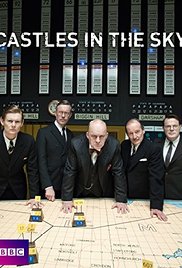
CASTLES IN THE SKY
UK, 2014, 90 minutes, Colour.
Eddie Izzard, Alex Jennings, David Hayman, Julian Rhind- Tutt, Laura Fraser, Karl Davies, Celyn Jones.
Directed by Gillies Mac Kinnon.
Castles in Sky is an interesting film for television, directed by the veteran Gillies Mac Kinnon who made quite a number of small budget films and worked extensively in television series.
The film is the story of Robert Watts Watson, a weather scientist who came up with what eventually became radar detection. Eddie Izzard gives an interesting and very serious performance as Watson. The film takes place between 1935 and 1940, includes a great deal of the contemporary footage of Hitler, the development of the Luftwaffe, the plans for invasion – as well as the British government response.
Watson gives a basic idea to the government officials, played by Alex Jennings and Julian Rhind- Tutt, with constant opposition from Professor Lindemann, David Hayman, who supported equipment development for attack has the best way of defence.
Watson chose workers, not from the universities of Oxford and Cambridge, but rather ordinary workers – with a symbol of not wearing ties. There is a background of Watson’s relationship with his wife, Margaret, Laura Fraser, and the pressure of his continually being away from home and the breakdown of the marriage because of his dedication to his work.
The film develops the work, the details of the experiments, continually getting ideas, testing, lack of financial support, reports to government, gradual improvements, tests which failed, tests which succeeded – and the final sequence where the radar is used during the Battle of Britain in 1940. Watson was knighted in 1942 – and the influence of his insights and developments have had enormous scientific and strategic repercussions and consequences.
1. A tribute to Robert Watts Watson? Inventor? Radar? Contribution to the defence of Britain in World War II?
2. The re-creation of the 1930s, Britain, the countryside, Whitehall, weather scientists, government recruitment, experiments and inventions, developments and difficult financial conditions, support and criticism? The venues for working, old sheds, the coast, the mansion? The tests? The musical score?
3. The title, the reference to the radar centres and their work, linking them along the British coast?
4. The extensive inclusion of footage of Hitler, spirit in Germany in the 1930s, the development of the Luftwaffe?
5. The portrait of Robert, Eddie Izzard’s performance, age, experience, marriage to Margaret, his work with the weather, home life, his nephew and his help? His assistant?
6. The government, the discussions about Hitler’s building plans, the Luftwaffe, the interviews, the eccentric schemes, Robert and his awkwardness dropping the papers, the explanations, the attention Tizzard and Rowe? The choice of him to work?
7. Robert, local, not wanting Oxford dons, the call to Oxford and the phone in the fish tank? Interviews, Taffy and his Welsh background? The symbolism of not wearing ties?
8. Assembling the team, his friend, the official secrets act and death by hanging? Their gathering, the old estate, limited resources, the blackboard, using their ingenuity? Issues of power and speculating on them? Issues of range?
9. The basic principle of radar, the ionosphere, bouncing signals back to earth? The hard work, the difficult tests? Gradual understandings? Robert and his frustration, his apology to the men? The cricket match? Taffy and his ideas? The continued development?
10. Tizzard, his support, the meetings, security? Rowe as the go-between, his wariness, support? The visits of the air chiefs? The continued hostility of Professor Lindemann and, his contact in the staff and being up-to-date with information?
11. Churchill, his coming to power, his convening the meeting, the discussions about the signal, Robert and his explanation of the five castles, Churchill giving the go ahead? The opposition of Lindemann? His contact man exposed, got rid of?
12. The tests, stealing the material from the Navy? Success, detecting the planes, Lindemann wanting low-level detection? Wanting to take over? Robert about to give up? The television set, the smaller valves?
13. Robert and his dedication, love of his wife, their scenes together, the phone calls, the visit to the hotel, his dinner and forgetting it and sleeping, forgetting his wife’s anniversary, going home, her leaving the note? No further information about the relationship?
14. The test, the actual use of radar for defending in the Battle of Britain, sending up the planes, guiding their attacks? Lindemann and his ousting of Robert during the Battle of Britain? Rowe urging him out?
15. The tribute to Watson, his knighthood in 1942, the extraordinary influence on developments in his basic ideas and experiments?